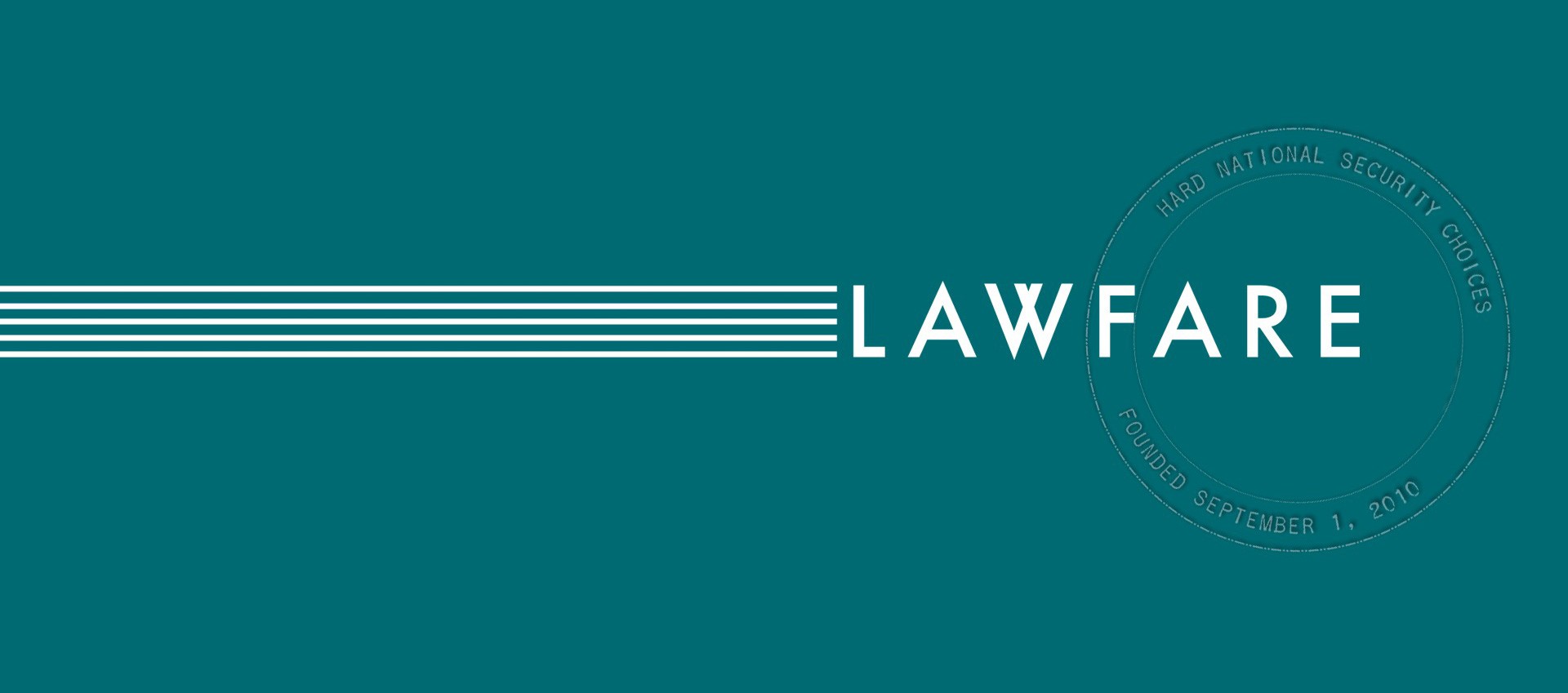The Week That Was: All of Lawfare in One Post

Published by The Lawfare Institute
in Cooperation With

Benjamin Wittes reflected on last weekend’s attacks in Israel by Hamas and raised two questions: What was Hamas’s strategic objective with these attacks? What should Israel’s be in response?
On the Lawfare Podcast, in an interview punctuated twice by missile attacks, Wittes spoke with Noah Efron about the Hamas attack, its impact on Israeli society, and the coming Israeli response in Gaza. They discussed the weird interregnum between the violence over the weekend and the violence that's to come and how quiet things are right now, whether Israeli society is coming together or whether it is coming apart, the implications of Hamas’s hostage-holding, and more:
On Lawfare Live, Scott R. Anderson sat down with Daniel Byman, Ghaith Al-Omari, Natan Sachs, and Wittes to discuss Hamas’s attack on Israel, the ripple effects the attack is having in the region, the role that Iran and other actors may have played, and what it may mean for the region and the world:
Audio from the Lawfare Live with Anderson, Byman, al-Omari, Sachs, and Wittes was also published on the Lawfare Podcast:
On Rational Security, Anderson, Quinta Jurecic, and Alan Rozenshtein sat down with Wittes to discuss Hamas’s attacks in Israel, Israel’s military response, and what it might mean for the rest of the world:
Byman discussed the various forms of intelligence failures that may have resulted in Israel’s intelligence services failing to foresee and stop the Hamas attack.
Solon Solomon discussed comparisons of 9/11 and the Oct. 7 Hamas attack on Israel, and examined the operational and legal conditions that Israel must consider in its response.
Nicholas Weaver discussed the implications of a video purportedly showing a Hamas drone destroying an Israeli tank, and why the Israeli drone defense failure should worry U.S. military planners.
Anna Hickey shared a livestream of President Biden’s remarks addressing the Israel-Hamas conflict.
In Lawfare’s Foreign Policy Essay series, Michael Beckley argued that China is a “peaking power,” that such powers are often economically and militarily aggressive, and that the challenge for the U.S. will be containing China without causing the CCP to lash out.
On the Lawfare Podcast, Tyler McBrien sat down with Anderson to discuss the various legislation, legal opinions, and communiques that have defined the U.S. position towards Taiwan and how tensions between the executive and legislative branches might play out following an attack on Taiwan:
Yuliya M. Ziskina argued for the legality and necessity of the Rebuilding Economic Prosperity and Opportunity for Ukrainians Act.
William Byrd discussed some strategically determinative failures that the U.S. made in Afghanistan, largely related to the shadow cast by 9/11, that begin to explain poor U.S. decision-making.
Obaidullah Baheer explained how calls to criminalize recognition of the Taliban regime by codifying gender apartheid as a crime against humanity may do more harm than good. He argued that it could potentially justify future harmful interventions, and ignores the reality that the Taliban is in power and that viable change can only come from within.
Susan Landau discussed the relationship between end-to-end encryption (E2EE) and child sexual abuse and exploitation (CSAE), arguing that legislative efforts to limit or ban E2EE would not prevent CSAE in the long-term and would come at great privacy costs.
On the Lawfare Podcast, Rozenshtein sat down with Tino Cuéllar and Hadrien Pouget to discuss what lessons history can and can't teach us when it comes to regulating AI and what an international regulatory framework for AI might look like:
On this week’s episode of “Lawfare Live: Trump’s Trials and Tribulations,” Wittes sat down with Anna Bower, Jurecic, and Roger Parloff to discuss recent hearings in the Fulton County election interference case, a hearing in the Mar-a-Lago case, and more:
On Lawfare No Bull, Bower shared edited audio of the Oct. 10 and Oct. 11 hearings in Fulton County Court in which Judge Scott McAfee heard arguments on a number of pre-trial motions in the Kenneth Chesebro and Sidney Powell trial, including motions to dismiss the indictment and motions to dismiss the racketeering charges:
On the Lawfare Podcast, Wittes sat down with Bower, Jurecic, Natalie K. Orpett, and Parloff to discuss updates in the New York civil case, bail bondsman Scott Hall’s guilty plea in Fulton County court, and more:
Also on the Lawfare Podcast, Anderson sat down with Molly Reynolds to discuss the history of the rule behind Speaker Pro Tempore Patrick McHenry’s (R-N.C.) appointment, what authority its authors intended for it to provide, and what it means for Israel, Ukraine, and the pending government shutdown:
Hyemin Han examined the lawsuit brought by Students for Fair Admissions (SFFA) against the U.S. Military Academy at West Point for its use of race considerations in admissions, challenging the Supreme Court’s military academies carveout in SFFA v. President and Fellows of Harvard College.
Mark Nevitt discussed President Biden’s decision to waive environmental restrictions to build a new 20-mile section of the border wall.
On Chatter, David Priess sat down with Nassir Ghaemi to discuss the challenges (and surprising advantages) of assessing the mental illnesses of historical figures, why the best crisis leaders are either mentally ill or mentally abnormal, and more:
Orpett shared that applications for the Lawfare Student Contributor Program for the 2023-2024 academic year are open. The program allows law students in their second and third years, LLMs, and SJDs (or foreign equivalent) to submit articles and provide research support on issues at the nexus of national security, law, and policy. Applications are due by Oct. 16, 2023. Apply here.
And Rozenshtein shared that the University of Minnesota Law School will hold a conference bringing together legal and policy experts to discuss the lawsuits to disqualify Trump from the 2024 presidential ballot. Register for the conference here.
And that was the week that was.



